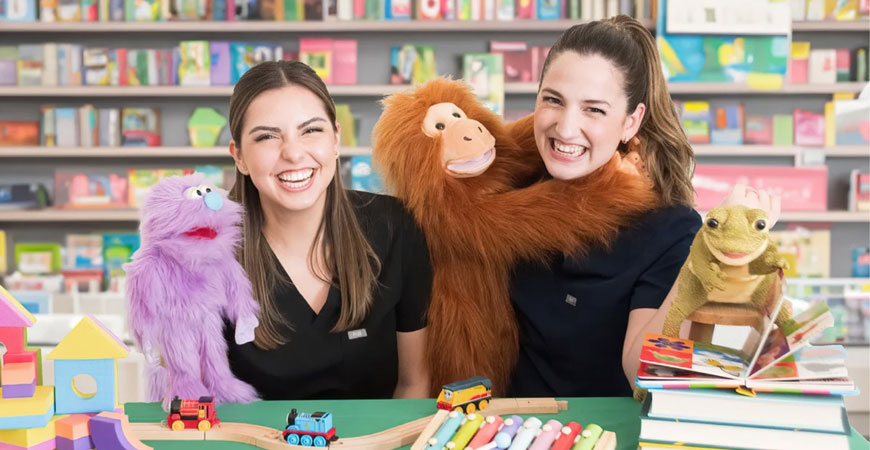
(Lee este artículo en español.)
Take the cultural rewards of preserving Spanish for babies and toddlers in a bilingual home. Bring in two speech pathologists steeped in techniques that make language learning irresistible for young minds. Sprinkle in bright colors, bold graphics and infectious energy. Bolt everything to the most powerful video-sharing website on the planet.
Add puppets.
The result is TeleLingo, a YouTube channel created to fulfill a need for Spanish-only educational videos, with content that uses evidence-based strategies to promote speech and language development.
TeleLingo’s two Texas-based creators will make a special appearance at UC Merced’s Bobcat Day on April 20. Lorena Aceves Hernandez and Brenda Sanchez will do a live performance based on their engaging videos. In addition to delighting all in attendance, they will provide parents and caregivers with tips and resources to use at home for their young ones’ bilingual journeys.
The one-hour TeleLingo presentation is the centerpiece of an event called Unity in Diversity scheduled for 1:30 p.m. in the UC Merced Conference Center’s Dr. Vikram and Priya Lakireddy Grand Ballroom. There is no admission charge but those who want to attend are urged to register .
The goal of TeleLingo isn’t just to immerse children from infants to age 5 in Spanish words and phrases. It also provides techniques for the adults so they can be effective teaching partners.
The word is getting out. TeleLingo’s YouTube channel has 16,400 subscribers and 3.4 million views across about two dozen videos. A companion Instagram account aimed at parents has more than 6,600 followers.
“It’s been amazing to have an impact on these young lives and their families,” said Hernandez. “This is not a typical career trajectory for a speech language pathologist.”
Text posted below each video is filled with instructions, do-this-at-home suggestions, addresses to resources, translations and a transcript.
The videos themselves are a carefully composed symphony of props, green-screen backdrops and graphics, along with two charismatic hosts. Hernandez and Sanchez talk straight to the camera, as if they and the child are in the same room. They point to their mouths to emphasize the shaping of a word. They ask the viewer to repeat a word and then wait a few beats – what they call an expectant pause.
“The child is more likely to think, ‘Oh, they want me to respond,’” Sanchez said. “If you’re just talking all the time, the child is going to just sit and listen.”
Just as important, they don’t just run through words on a list; they put them in a context – a nursery rhyme, a song or story, descriptions of emotion, a trip to the beach.
Oh, and the puppets. Hernandez and Sanchez are assisted by Lily, a Muppet-like creature with lilac fur and a sky-blue nose, and an olive-green frog named Ana.
“We get so many messages that the kids are fans of these characters. They do their voices,” Hernandez said.
Assemble these elements, among others, and you have language modeling, a focused, repeatable approach that TeleLingo urges the kids’ caregivers to use.
It’s been amazing to have an impact on these young lives and their families.
Hernandez and Sanchez started TeleLingo in March 2023. They were inspired in part by teletherapy video connections they did during the COVID-19 pandemic. Then Sanchez, a first-generation Mexican American, was unable to find quality Spanish-only education videos for her young daughter. So, she and Hernandez made their own.
Many months later, a UC Merced staff member had a similar experience with her 2-year-old daughter. Dulcemaria Garcia, assistant director of outreach and engagement with the Calvin E. Bright Success Center, found TeleLingo. In January, as president of the university’s Language Accessibility Committee , she raised the idea of bringing Hernandez and Sanchez to the Central Valley.
“Even in my home, we don’t speak Spanish all the time. We’re always switching between Spanish and English,” Garcia said. “(The TeleLingo hosts) do such a good job of capturing not just the language, but the culture.”
“We really love what we’ve heard about UC Merced,” Hernandez said. “How diverse the student population is. How inclusive it is. We are so excited.”